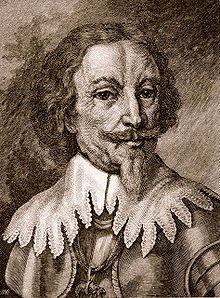Gottfried Heinrich Graf zu Pappenheim
| Gottfried Heinrich Graf zu Pappenheim | |
|---|---|

Gottfried Heinrich Graf zu Pappenheim
|
|
| Born | 29 May 1594 Pappenheim on the Altmühl, Bavaria |
| Died | 17 November 1632 (aged 38) Leipzig, Saxony |
| Allegiance |
|
| Years of service | - 16 November 1632 |
| Battles/wars | |
Gottfried Heinrich Graf zu Pappenheim (29 May 1594 – 7 November 1632) was a field marshal of the Holy Roman Empire in the Thirty Years' War.
Pappenheim was born in the little town of Treuchtlingen, a secondary seat of his family, the ruling Lords of Pappenheim on the Altmühl in Bavaria, a free lordship of the empire (see: Pappenheim (state), from which the ancient family to which he belonged derived its name. He was the second son of Veit zu Pappenheim, Lord of Treuchtlingen and Schwindegg, and his second wife Maria Salome von Preysing-Kopfsburg.
He was educated at Altdorf and Tübingen, and subsequently traveled in southern and central Europe, mastering the various languages, and seeking knightly adventures. His stay in these countries led him eventually to adopt the Roman Catholic faith (1614), to which he devoted the rest of his life. At the outbreak of the great war he abandoned the legal and diplomatic career on which he had embarked, and in his zeal for the faith took service in Poland. The experience gained in the service in the Polish army (especially in the way of fighting cavalry) will soon be able to take advantage of fighting on the side of the Catholic League.
He soon became a lieutenant-colonel, and displayed great courage and ability at the battle of the White Mountain near Prague (8 November 1620), where he was left for dead on the field. In the following year he fought against Mansfeld in western Germany, and in 1622 became colonel of a regiment of cuirassiers. In 1623, as an ardent friend of Spain, the ally of his sovereign and the champion of his faith, he raised troops for the Italian war and served with the Spaniards in Lombardy and the Grisons. It was his long and heroic defence of the post of Riva on the Lake of Garda which first brought him conspicuously to the front.
...
Wikipedia
